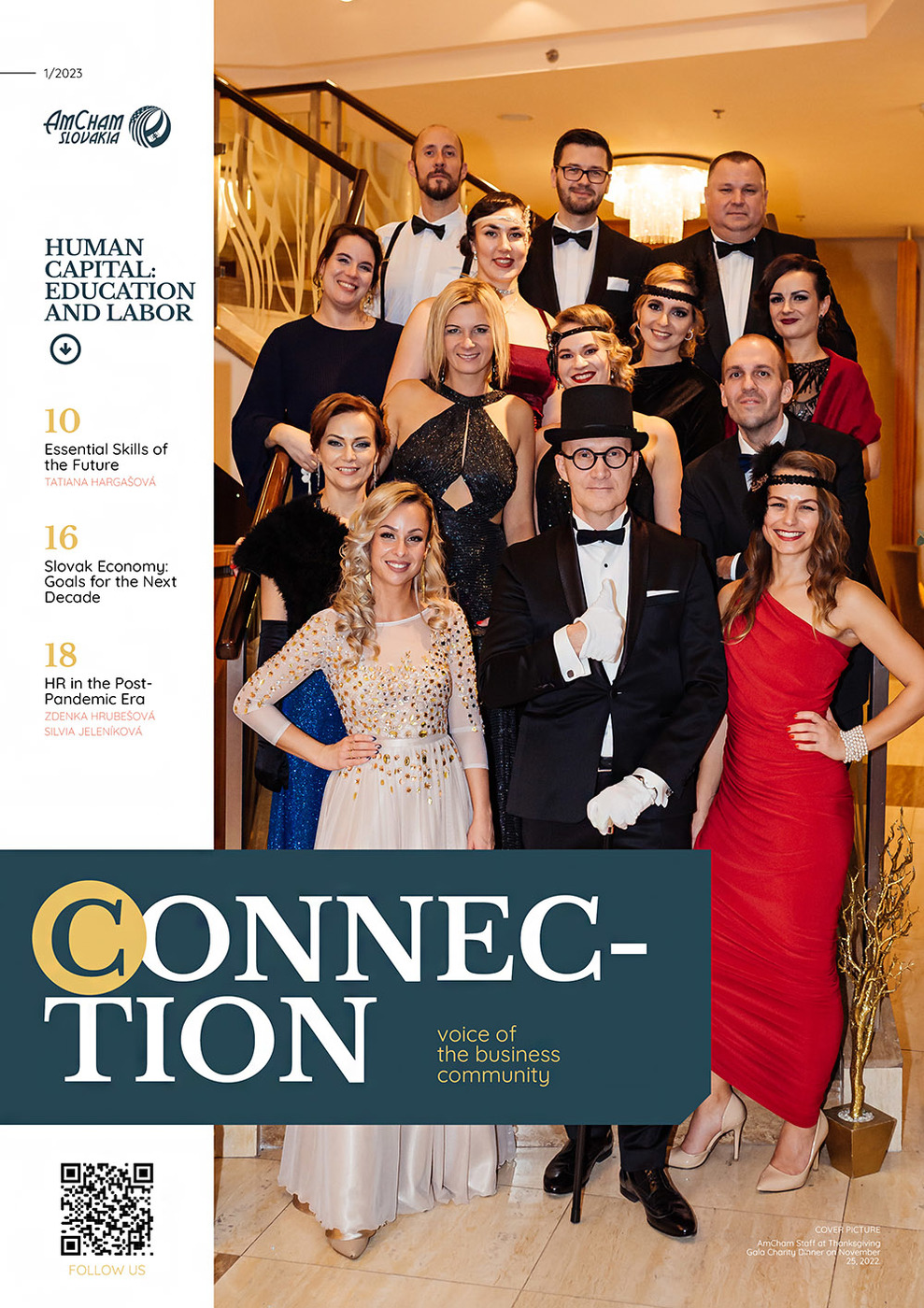WHAT SHOULD BE THE GOALS FOR THE SLOVAK ECONOMY IN THE NEXT TEN YEARS?
ĽUBICA GUBOVÁ - Country Lead VISA pre Slovensko
Economic recovery after the pandemic can be accelerated if governments actively consider digitization at all levels. From our point of view specifically, digital payments can play a key role in areas such as disbursements, data, tourism, urban mobility, and public administration.
The past two years have fundamentally altered retail, and consumers and sellers have discovered new ways to embrace innovation. Digitization has revolutionized retail as convenience became the top consumer motivation and online shopping reached levels we did not expect in at least five years. We have to continue in this trend and bring new possibilities and innovations. As the urgency of combatting the global climate crisis grows, we must also continue to seek out opportunities to support sustainable commerce and inclusive economic growth.
MARTIN MAŠTALÍR - General Manager, DELL Technologies Slovakia
Digitization of the country and its services for the inhabitants and entrepreneurs of Slovakia. To simplify the provision of services on both sides - the customer and the provider. The basic condition is a suitable infrastructure, and of course one of the important prerequisites for the digitization strategy is continuity and planning. The digitization plan should consider the real trends and needs of the country in the context of the EU and be superior to political decisions. Digitization not only simplifies the provision of services, but when applied correctly, the positive effect will also be reflected in financial and personnel savings. Digitization in the SME sector needs special attention, considering the dynamics of the Slovak market, as the SME sector is one of its key pillars.
Finally, an element of communication and discussion between the private and public sectors in the planning and use of expert resources is important for the development of digitization.
MAREK HOLKA - Partner, ČECHOVÁ & PARTNERS
 Slovakia has excellent brains, who must feel appreciated and wanted at home. Opening up to the world allowed the best and brightest from Slovakia to pursue education and career in the most prestigious institutions around the globe. Now is the time to absorb positive models from the world, and to create a model that sees education not as a mere training for the labor market, but as a value in itself, overcoming mediocrity, encouraging critical thinking and innovation.
Slovakia has excellent brains, who must feel appreciated and wanted at home. Opening up to the world allowed the best and brightest from Slovakia to pursue education and career in the most prestigious institutions around the globe. Now is the time to absorb positive models from the world, and to create a model that sees education not as a mere training for the labor market, but as a value in itself, overcoming mediocrity, encouraging critical thinking and innovation.
Another equally important challenge is healthcare, where we are lagging behind our neighbors. Slovakia will only stop its brain drain if the people are assured they can obtain a world-class education, and work in an inspiring, state-of-the-art environment at home.
VLADIMÍR ŠOLÍK - Executive Director, Siemens Healthcare s.r.o.
To predict the future has never been easy, but I think it is even more difficult now as we have to be ready to embrace the culture of change. Change requires a new attitude, a modification, and a transition from our comfort zone of the familiar, in purchase decisions and behavior. Slovak industries still benefit from being a leader in automation. However the transition should focus, in my opinion, on educated skilled workers, as they have the potential to impact the economic growth of the country. There are some national initiatives and campaigns, supported by our government, focused on attracting young Slovak talents to return from abroad. It is important to find a way to motivate them to return. The “skilled economy” has the ability to contribute and support our country’s development.
VĚRA VÝTVAROVÁ - Country Managing Partner, PwC Slovensko
Slovakia should invest in increasing the technology level of industries, digital transformation in business and public sector, digital upskilling of the workforce and increasing the level of university and high school education.
We believe a business’s impact on the environment will become an important factor in maintaining competitiveness and a key driver of success. Slovakia must also focus on the sustainable future of business and society and take environmental and social aspects into consideration when making strategic decisions. Slovakia needs to become more attractive to investors and the business community. Our country has one of the highest tax and contribution burdens in the EU and EFTA. Creating a more motivating environment for R&D investments will help increase the technology level of manufacturing industry, which the Slovak economy is dependent on.
MARIUSZ GATZA - CEO, Orange Slovensko
First of all it is the transformation of the education system. It is not only about knowledge. We need young people to be prepared for all the challenges of the future, people with open and curious minds, with self-confidence to challenge the status quo and fight disinformation. We need to create supporting conditions for research and development.
Another goal should be to increase the robustness of the economy, diversify the resources, manage and mitigate the threats and risks.
MARCELO PASCUAL - Managing Director, Merck Sharp & Dohme, s.r.o.
 Slovakia needs modernization in general. As a small country it needs to make the system and process efficient and less bureaucratic. There are lots of opportunities for investment here, but the investment needs to be attractive and available. Another important aspect is partnership. The public sector needs the private sector, and vice versa. A good partnership, together with a strong element of trust, can make a difference.
Slovakia needs modernization in general. As a small country it needs to make the system and process efficient and less bureaucratic. There are lots of opportunities for investment here, but the investment needs to be attractive and available. Another important aspect is partnership. The public sector needs the private sector, and vice versa. A good partnership, together with a strong element of trust, can make a difference.
Look at Estonia, also a very small country, which has managed to build one of the world’s most advanced digital societies long before the COVID-19 pandemic, providing services such as electronic voting, online learning in schools, digital bureaucracy and healthcare. When the coronavirus crisis struck, this investment paid off as Estonia’s digital public services continued mostly uninterrupted. Public-private partnership and trust in public institutions are the secret of Estonia’s success. Citizens embraced the digital revolution because it was transparent, fair and to the benefit of all.
JOZEF BARDÍK - CEO CF group, Managing Director, Foodtech Ventures
Education – we need to move our school system forward. Ease of doing business - we have fallen in the Ease of doing business ranking, and being a small and open economy, we will really be able to move up once again. Further, digitalization of economy with the aim to also simplify state bureaucracy – digital tools can be our huge advantage, but of course not in the way as it was done for the past ten years.
Otherwise, in sector orientation - I don’t think there should be too many goals for this. Economy is a living organism and what the government and third sector can do is to prepare the ecosystem and make the life of entrepreneurs easier - not set goals per se.
KLAUDIA BEDNÁROVÁ - Director, The Bridge - English Language Centre, s.r.o.
First of all, to support adult education businesses in order to keep our workforce cognitively fit and able to face our fast changing and demanding business world. We need to nurture knowledge-based ventures, support the IT industry, sport, the arts, sustainable tourism and last but not least, develop green solutions in each one of those fields.
MARTIN ADAMKA - Head of Marketing, Ness Slovakia
 One of the key issues is to finally properly reform our education system. Children cannot be taught in the same way and the same things as ten or twenty years ago. It is a completely different world now. So is the labor market. You need people with completely different skills and we are unable to reflect those challenges in the education system. For several years Ness Slovakia has been operating in the IT sector, which is permanently looking for tens, even hundreds of people on the labor market, which is extremely difficult.
One of the key issues is to finally properly reform our education system. Children cannot be taught in the same way and the same things as ten or twenty years ago. It is a completely different world now. So is the labor market. You need people with completely different skills and we are unable to reflect those challenges in the education system. For several years Ness Slovakia has been operating in the IT sector, which is permanently looking for tens, even hundreds of people on the labor market, which is extremely difficult.
The second key issue is the support for startups and development of innovative possibilities in companies. We cannot be a country that only receives innovations and products from abroad. We have to make those. That is why we need to build the environment, technological background and set the right mindset in the entire society. Estonia is a great example for us. It is a country that throws new young companies with regional and global ambitions to the market. If I were to look for the future “European Spotify”, I would look for it in Estonia.
The answers were originally submitted for AmCham’s “Who is Who?” 2022 Almanac.



Follow us